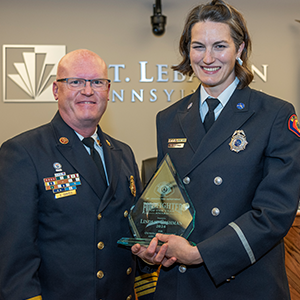town topics
GARAGE CONSTRUCTION Renovations to the North Parking Garage are coming to a close for this year. Beginning at 6 p.m., on Friday, October 2, the garage’s upper level will be closed to allow for the final coating and painting of the parking decks. All vehicles will be required to leave the garage at that time. Patrons and permit holders can use the South Garage or the Academy Lot while the North Garage is closed. The repair work will continue throughout the weekend, and the garage will reopen at 6 a.m., Monday, October 5. Because the work is dependent on the weather, it could be pushed back to the following weekend, or the weekend of October 23-25.
 LESS POISON, MORE EDUCATION Mt. Lebanon has discontinued its rat-baiting program, and is putting more emphasis on educating people about how to keep rats at bay by taking away their habitat.
LESS POISON, MORE EDUCATION Mt. Lebanon has discontinued its rat-baiting program, and is putting more emphasis on educating people about how to keep rats at bay by taking away their habitat.
Code enforcement officer Phil Quattrone, who is spearheading the effort, says that the poison bait program was not very effective.
“If we focus more on education, we can reduce the opportunities for rats to find food and shelter,” says Quattrone.
One of the prime attractions for rats is bird feeders. What the birds drop on the ground can become a buffet for mice and rats, but the vermin will eat just about anything, including garbage and animal feces. If you clean up after your pets and put your trash out for pickup in a sealed container, you can whittle down some food sources. Also, any pet food you leave outside is fair game.
Inside, store grain products in glass or metal containers. This will prevent the critters from nibbling on your rice or pasta. Potatoes and onions are also safest kept in the refrigerator or in metal or glass containers.
Rats can nest in brush and compost piles and can burrow into wood piles that are on the ground. Storing wood up off the ground in a box or other container can eliminate a potential rat shelter, as can cleaning up brush and lawn cuttings.
Rats can enter your house through holes in wood, brick, pipe—even the venting for your drier. Once inside, they’ll roam around the infrastructure, chew through wood cabinets and help themselves to food in cardboard containers.





